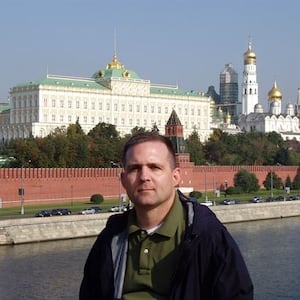Welcome to Rabbit Hole, a breaking-news analysis that helps you get smart on the one story everyone’s obsessing over—for Beast Inside members only.
Former spies say Paul Whelan almost certainly isn’t one of their own. His family says he’s innocent. So why would the Russians grab him? Trade fodder is the popular view among former intelligence officers and Whelan’s own lawyer has floated the possibility. Would the Russians really grab someone on a false pretense just to swap him for one of their spies? Well, the Soviets did exactly that, a few times, including once at the same hotel where Whelan was grabbed.
Frederick Barghoorn: Long before the Federal Security Service (FSB) slapped the cuffs on Whelan at the Metropol hotel in Moscow, where he was attending a wedding, they arrested Yale Professor Frederick Barghoorn there in 1963. A stranger approached Barghoorn, asked if he was an American citizen, and thrust a handful of newspapers into his hands as “almost simultaneously a couple of men grabbed me and took me to an auto,” he said later. President John F. Kennedy raised his case personally with the Soviets and defended his innocence. The Soviets, surprised by the ferocity of the backlash, released him after 16 days.
ADVERTISEMENT
Declassified CIA documents show analysts believed that “Soviet authorities regard an occasional espionage case as a useful device for warning the Soviet people against unmonitored contacts with Westerners, [U.S. Ambassador Foy Kohler] feels the primary motive in the Barghoorn affair was the desire to secure a hostage for I.A. Ivanov.”
Igor Ivanov, a driver for the Soviet trade mission, was arrested by the FBI alongside two Russian diplomats and John Butenko on espionage charges before Barghoorn was taken into custody. The feds caught Butenko, a top-secret-cleared telephone company employee, passing along classified documents about a Strategic Air Command communications system. Ivanov’s diplomatic colleagues had immunity, but he didn’t and was convicted alongside Butenko. The U.S. ultimately let Ivanov go home before having to serve out his sentence.
Nicholas Daniloff: Daniloff, a correspondent for U.S. News and World Report, was on guard during the final days of his five-year tour in the country in 1986. In his memoir, he wrote that he “knew the KGB’s practice of moving against a correspondent, scholar, or businessman in the last days of an assignment, usually once the successor was in place.” Sure enough, when he met a Soviet friend to hand off some Stephen King novels during a farewell meeting, “some half a dozen men, wearing ordinary street clothes, emerged and seemed to glide toward me,” he wrote. The KGB goons, with camera crew in tow, found purportedly classified maps planted in the newspapers his friend had handed over.
The price for Daniloff was another employee of the Soviet U.N. mission, Gennadi Zakharov, who was caught just days earlier by the FBI engaging in espionage without diplomatic immunity. Zakharov had been paying a Guyanese citizen studying in the U.S. for unclassified information and began prompting him for proprietary information when he got a job at a high-tech “manufacturer of precision components for use in the engines of military aircraft and in radars,” according to his indictment. The FBI moved in and arrested Zakharov, but the Daniloff arrest worked—the Reagan administration later agreed to a swap.
F. Jay Crawford: Crawford, a businessman posted in Russia as a representative of International Harvester, was arrested in 1978 on his way to a cocktail party, not on spy charges but for making purported black-market currency trades. Once again, his arrest followed the detention of three Soviet citizens—two of whom lacked diplomatic accreditation—on charges that they’d tried to buy classified information off a U.S. naval officer during an FBI sting operation. The Carter administration agreed to the implicit terms and released all three to the Soviet Union, and the Soviets released Crawford.
Butina gambit? So, back to Paul Whelan. His lawyer, Vladimir Zherebenkov, is an interesting character. In the American criminal-justice system, the ideal is that your defense lawyer will engage in “zealous advocacy” on your behalf. Zherebenkov, however, has gone out of his way to praise the FSB and its case against his client. He’s publicly called for a swap of Whelan for a “Russian soul” in custody, one that many assume is confessed foreign agent Maria Butina.
There’s something a little off about the idea of a swap for Butina because she’s not exactly facing proportionally hard time like the 10-20 year sentence hanging over Whelan’s head. Butina is looking at a possible sentence of around six months. She’s already served five months in prison and, if she received credit for time served, she could be out as soon as she’s done cooperating with prosecutors. So what’s the point of trading someone who’s got one foot out the door already?
Define “spy”: When assessing the charges against Whelan, you need to get into definitions because the word “spy” is used in a general way, but the intelligence world has more precise definitions. There’s a spectrum of activity that could be classified as espionage and it’s a spectrum that’s even longer in Russia, where things that would be completely innocuous in a democratic country can be arbitrarily reclassified as spying, like being a reporter from an unfriendly country. At the other end of the spectrum is being an intelligence officer, a person trained and employed by an intelligence agency to recruit agents and collect information.
Bad conduct: Whelan’s background has a number of red flags that would make it hard for him to work for the U.S. intelligence community. To be an intelligence officer, you need to obtain a top-secret clearance and pass a polygraph test. The Marines gave Whelan a bad-conduct discharge for larceny-related crimes while he was in the service. That kind of criminal record is not an absolute barrier to getting a clearance, but it does make it harder. Rabbit Hole reached out to Mark Zaid, an attorney who represents clients in the national-security bureaucracy on a range of issues, including security-clearance issues.
“There have been individuals who have criminal history in their past and are still able to get security clearances,” Zaid said. “You shouldn’t say that just because of this it makes it completely unlikely that he could get a security clearance. It becomes problematic and less likely, but I would never say unlikely. It depends on what the job is.”
Applicants can minimize the risk that a criminal history will tank their clearance depending on how long ago they were convicted, the severity of the conduct, and whether there were mitigating factors at play, and whether they’ve managed to stay clean in the time since the offense.
“When I’ve gotten people who have criminal-history clearances,” Zaid said, “it has typically been at a secret or top-secret level with the Department of Defense and its entities, rather than CIA, DIA [Defense Intelligence Agency], NSA.” By contrast, intelligence agencies can be stricter about handing out clearances.
Passport hoarding: In addition to his criminal history, Whelan would also face obstacles with his multiple foreign passports. According to The Washington Post, he held at least four passports—one for the U.S., U.K., Ireland, and Canada—and “collected them as a game” in competition with his sister. Federal rules say, “By itself: The fact that a U.S. citizen is also a citizen of another country is not disqualifying.” Like a lot of things, it all depends. A passport with the U.K., America’s closest ally, might not raise as many red flags as one from, say, Iran. But four passports is a lot and would raise more questions for clearance adjudicators.
Further down the trough: Taken together, Whelan would face some steep hurdles to overcome in order to get a clearance. What’s more, former CIA officers told The Daily Beast that the risk of sending someone to Russia without diplomatic immunity is so great that they wouldn’t have done it.
At the other end of the spectrum: However, just because you’re not an intelligence officer doesn’t mean you can’t work in the espionage business. Further down the spectrum are agents, the people recruited by intelligence officers to provide information, and “access agents,” people who can make introductions or provide access for an intelligence officer. The taxonomy of the Soviet KGB, the predecessor to the agency that detained Whelan, included tiers below agent, which included “confidential contacts”—people who weren’t formally recruited agents but who would accept taskings and money for their services and would provide helpful chatter on a confidential basis. Agents and contacts aren’t staff and don’t need security clearances.
Burden of proof: The problem here is that the burden of proof is on the people making the claim, in this case Russia’s FSB. So far it hasn’t provided any evidence to support its claims about Whelan’s espionage whatsoever. It appears to have leaked a claim to a Russian news outlet. RosBalt reported that authorities caught Whelan accepting from a Russian contact a USB drive that contained classified information about the identities of Russian government employees. But a claim laundered through a friendly outlet falls far short of proof.
What’s next for Whelan: For those hoping Whelan could be freed soon in a swap, the Russian foreign ministry isn’t sounding eager. Russian Deputy Foreign Minister Sergei Ryabkov said over the weekend that talk of a swap is still premature, meaning a swap isn’t likely to happen soon if it even comes off. In the meantime, Russia has said it’s seeking access to a Russian citizen arrested by the FBI in the Northern Mariana Islands shortly before New Year’s Eve.








